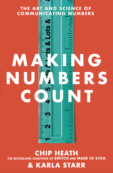Check out this great piece in the Times on Rare, the conservation organization we wrote about in Switch. (I was so inspired by the Rare team’s work, in fact, that I signed up as a trustee.) Rare’s strategy is focused on bright spots — finding what’s working and doing more of it.
Btw, the author of the NYT piece, David Bornstein, also wrote a terrific book called How to Change the World.



